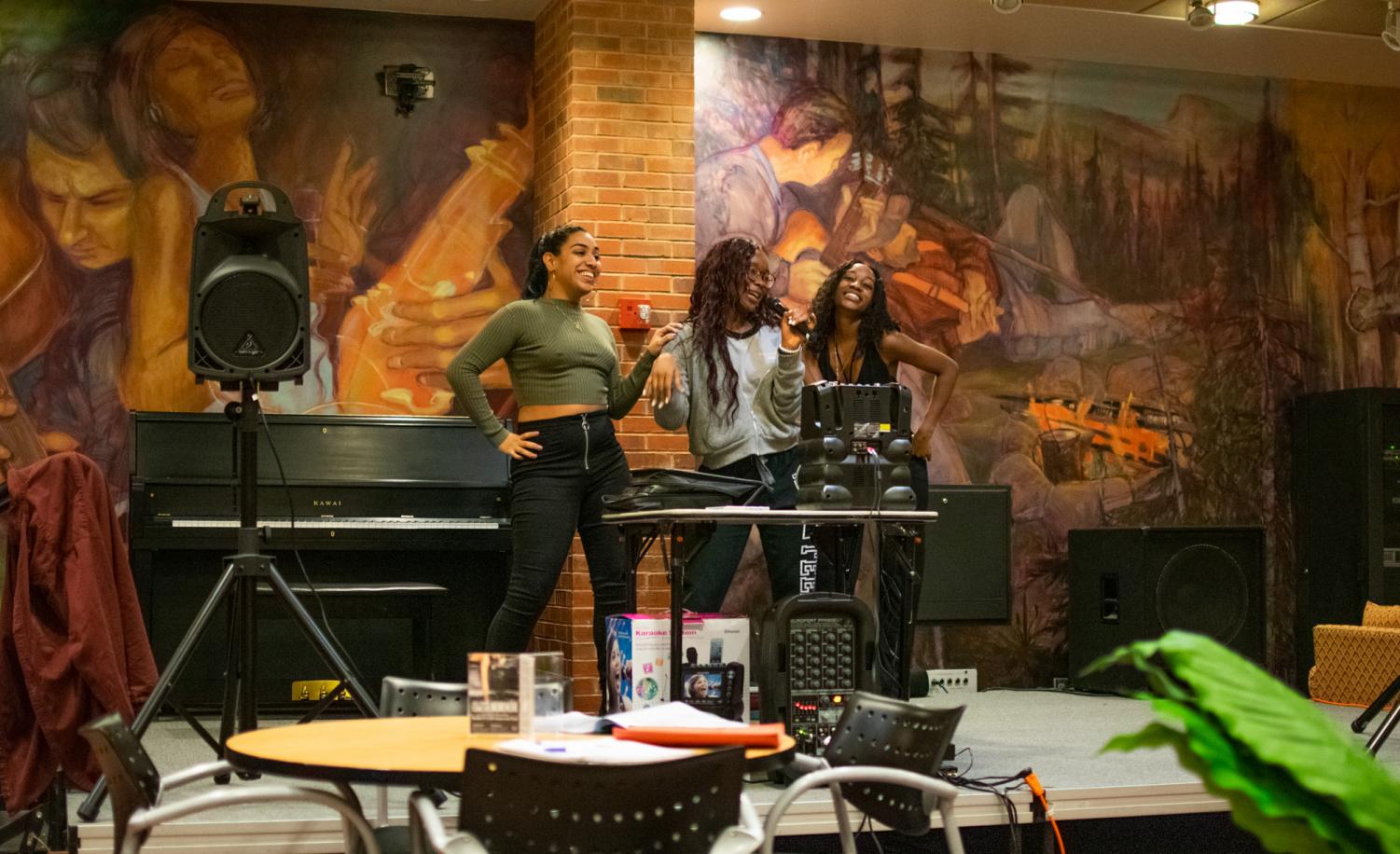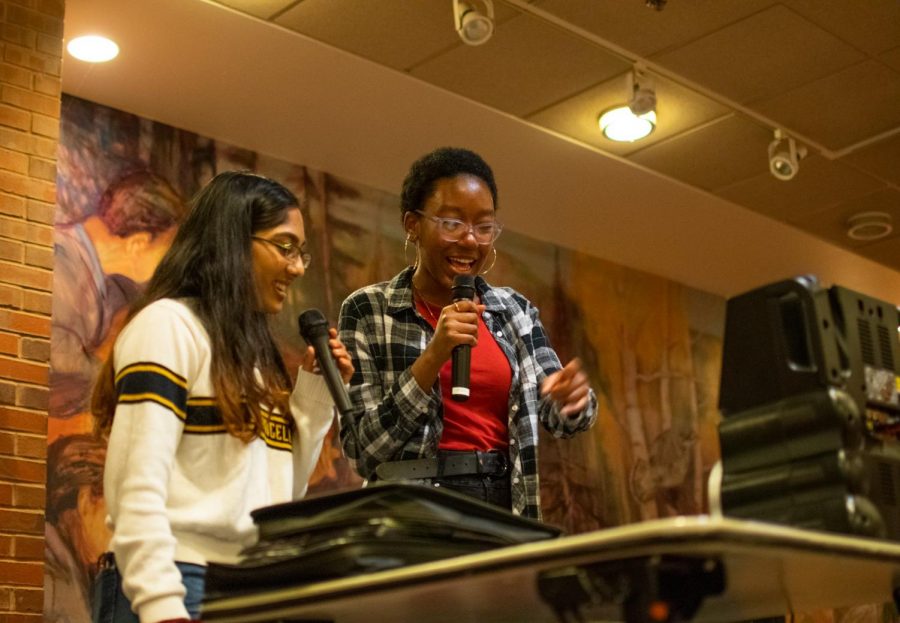Power and Privilege karaoke: Singing to create connections
December 5, 2019
There were smiles on students’ faces as first-year Nomonde Nyathi took to the Reid basement stage for the second time that evening — this time, for a karaoke rendition of Katy Perry’s “Hot N Cold.”
“It was pretty cool, because my friends were there, so I really liked that; I felt really comfortable in the space,” Nyathi said of her experience performing.
The karaoke night, which occurred on Monday, Nov. 18, was hosted by student leaders of the annual spring Power and Privilege Symposium to increase awareness for the symposium and to facilitate conversation on the topic of power, and its structural and interpersonal effects.
The event was an opportunity to have fun in a communal atmosphere of mutual support and to create connections between people.

First-years Elisa Colon, Eboni Haynes and Nomonde Nyathi strike a pose for the audience
“When we were thinking about events we were thinking about inclusivity — because the theme is ‘Building Bridges Not Walls’ — so we wanted to have fun [and] provide entertainment, [all within the context of] a very knit-together type of event,” said first-year Gabby Rose, one of the co-directors of programming for the symposium along with junior Jess Boyland.
Despite a relatively small turnout, the karaoke event was lively, engaging and entertaining. Only a few people volunteered to perform, so Nyathi and a few others had the opportunity to perform multiple times. The event was loosely organized, and based on volunteer participation, with, aptly, a very accessible “bridge” between student organizers and performers.
“It shows that we can come together in any way, in any form — whether it’s to chill or to talk about serious topics — to find common ground,” Rose said. “I think that’s what we’re trying to find when it comes to all of our events or when it comes to the symposium; we just want everyone to feel included. And that’s why, I think, we picked karaoke night. One, because it’s something that’s fun; two, because everybody can enjoy it; even if you don’t sing, you can still talk.”
For Rose, the event was successful insofar as it allowed for a collective gathering of individuals in a respectful and accessible space. Nyathi generally felt that the event succeeded in meeting these ends.
“It’s a lot of fun,” Nyathi said. “There are a lot of song options… and the organizers are really lovely people, so you feel very much welcome.”
For first-year Maria Martinez, an attendee, the music and performance was subordinate to the opportunity to foster dialogue on the theme of this year’s symposium, “Building Bridges Not Walls.”
“Although I do love karaoke, I felt [more] motivated to support my friend and the [themes of the] symposium as a whole,” Martinez said. “I feel the event as a whole was successful in opening up dialogue, as attendees spoke on their lives prior to Whitman. It can be very difficult to talk about issues, so I think the event was a nice and welcoming transition. Usually, karaoke nights don’t provide the space or platform to open heavy discussion about the various depths of racial issues or societal conflicts.”
At the same time, the relatively low turnout — while appreciable in that it created a very intimate and warm environment—was, according to Nyathi, a point of weakness for the event and the conversations on power and privilege it engendered, perhaps principally stemming from a lack of publicity.
“The only reason I know about it is because my friends were part of the team,” Nyathi said. “I did see some posters around […] but it really wasn’t something that was in your face.”
Martinez echoed this sentiment.
“It would have been nice to see more engagement from the Whitman community, especially from the instructional staff,” she said. “As students, support about issues from professors is crucial to the agenda of the symposium. Social justice doesn’t happen in the P&P space, it also happens in the classroom; it’s also a topic of discussion in our Encounters class.”
As Nyathi expressed, most attendees were close friends, and the performance spontaneously shifted from a karaoke event to an opportunity for comedic storytelling when, deprived of performers, Rose handed the microphone off to the audience; it passed around the circle of attendees, many of whom shared a personal story or witty remark.
The ambient attitude was that of informal humor, producing a more harmonious and spontaneous environment. It was clear that it is in this kind of solidarity — in mutual connection — that power and privilege are truly challenged, and that the individual can reclaim a certain kind of self-expression.
“We didn’t want to bombard people [by saying] ‘you have to do this; you have to do that,’” Rose said. “I’m definitely not that type of person; I want [people] to feel more willing… So when I felt that the karaoke was [dying] down, I [tried to initiate conversation instead].”
Martinez appreciated Rose’s efforts to create this kind group rapport.
“I was disappointed by the turn-out, but the few of us who did attend commemorated our time together, told stories, and sang poorly,” Martinez said. “I felt the event was meant to introduce the symposium [occurring this upcoming spring] and encourage people of color to share their experiences, and in that way, it was very successful.”






